| |
"There's a design at work in all art... events must play themselves out to an aesthetic, moral and logical conclusion. We aim at the point where everyone who is marked for death... dies. Generally speaking, things have gone about as far as they can possibly go when things have got about as bad as they can reasonably get." |
| |
The Player – Rosencrantz & Guildenstern are Dead |
One of the things that separates great writers from those of us who merely dabble is their ability to think well outside of the box, to take inspiration from unexpected sources and develop these ideas in unexpected and exciting ways. Take Tom Stoppard. Back in the mid-60s he was working as a drama critic with ambitions to be a playwright, and for his first performed work delivered a play built around the exploits of two of the minor characters from Shakespeare's Hamlet. As it turns out, plans were afoot back in 1968 to translate this stage production into a film with John Boorman as director, but the project fell through and lay dormant for another 21 years. The subsequent film remains the only one to be directed by Stoppard himself, which came about in part because, in Stoppard's own words, "I wouldn't trust anyone else to muck about with my play, and it needed mucking about with."
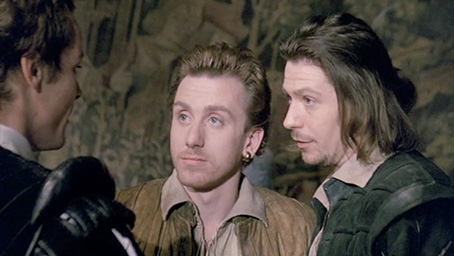
There seems to be more literary cred these days in claiming that you're not really a fan of Shakespeare's writings and that you far prefer those of Christopher Marlowe. I couldn't care less. I discovered the bard's work at an early age and fell for it hard. His use of language is sometimes elaborate and occasionally bewildering, while at others it is striking in its poetic economy. And it really is hard not to love Hamlet just a bit, being a play that gave birth to a disproportionately high number of commonly used phrases, and I'm talking about more than the lament for poor Yorick and an exquisite soliloquy that kicks of with a musing on whether to be or not to be. Try this little collection, all of which (as far as I'm aware) originated in this one Shakespeare play:
| To thine own self be true. |
| Though this be madness, yet there is method in 't (which has since mutated into "There's method in his madness") |
| The lady doth protest too much |
| In my mind's eye |
| Brevity is the soul of wit |
| What dreams may come |
| The primrose path |
| Neither a borrower nor a lender be |
| To the manner born (and yes, that's how the phrase was originally coined) |
| Murder most foul |
| The cat will mew and dog will have his day |
I could go on. Next time someone questions the modern relevance of the Bard's writings, throw a couple of those in their face. And while purists may shudder at the pop culture reference, every time I hear Hamlet enthusiastically greet his "excellent good friends," I almost expect to see him offering a welcome hand to Bill S. Preston and Ted Theodore Logan. As it happens, the two gentlemen he's actually referring to are the Rosencrantz and Guildenstern of the title, childhood friends of Hamlet who have been summoned to court by King Claudius to ascertain the cause and nature of the young prince's madness.
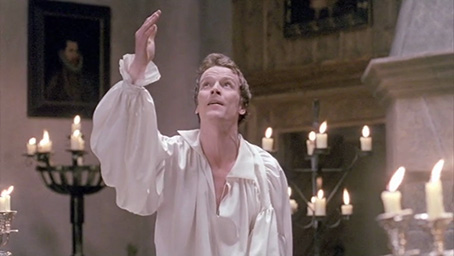
If you're not familiar with Hamlet and plan on seeing it for the first time soon, then you might want to give this review a miss for now, as any discussion on the plot of this film is going to act as a bit of a spoiler for that play. That said, you could argue that the title does this anyway, and you'd have to have never seen a Shakespeare tragedy (or be oblivious to that particular form of theatrical expression) to expect everything to work out happily for all at the end (see the quote at the top). But spoilers there are for those not familiar with the play, and they start right now.
The title Rosencrantz & Guildenstern are Dead is actually a line from the last act of Hamlet, delivered by a British ambassador after Hamlet's own demise. The specific relevance of the title here is open to a number of interpretations that it helps to promote. Like the later Pulp Fiction (stay with me here), it explores what happens to supporting players when they're not taking part in the drama in which they originally appeared, which in this case is Hamlet. Intermittently the film (as did the original stage production) dovetails with the play from which it takes inspiration, something clearly signalled for even those not familiar with Hamlet by the switch to Shakespearean dialogue from the more naturalistic – if still linguistically complex – banter of Stoppard's own words. Most of the time, however, our titular leads tend to be hovering in the wings, overhearing snippets of the unfolding plot as characters pass nearby, usually oblivious to the presence of these curious eavesdroppers.
The question raised by the title over whether the pair are destined to die or are already dead and caught in some purgatory time loop is subtly posed from an early stage. The film begins with both men on the road and unable to recall why or where they are heading. Coins tossed repeatedly by Rosencrantz, meanwhile, always come up heads. The suggestion is that the universe in which they move is somehow out of balance, a place where scientific logic has been disrupted and time fragmented. They eventually remember being called to Elsinore, but we never see them arrive, being transported there in an instant after an encounter with a group of travelling tragedians – led by a man known only as The Player – comes to an almost ghostly conclusion. Later, in a bathhouse, a naked woman appears to change gender and The Player disappears into a cloud of steam, visibly fading from existence only to reappear moments later in more decidedly solid form. Death repeatedly crops up in conversation, as a misheard word ("Are you deaf?" "Am I dead?"), as the subject of an argument about dramatic authenticity, or even as an eloquent, philosophical musing on the experience of being in a post-mortem state. In a particularly telling moment, the tragedians rehearse a play that effectively outlines how events will later unfold (as defined by Hamlet itself) and concludes with a double hanging, a targeted premonition that prompts Rosencrantz to apprehensively reach for his own throat.
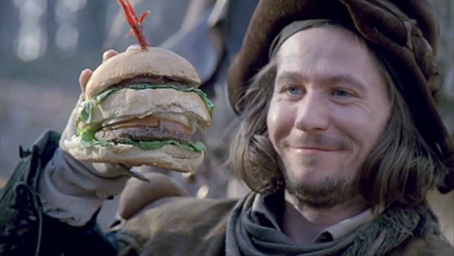
Adding to the sense of reality disassociation is the fact that both men keep mixing up their names, with Rosencrantz in particular repeatedly identifying himself as Guildenstern before being quietly corrected by his companion. They're not the only ones. Both Hamlet and King Claudius also mix the pair up, amusingly mistaking and then correcting themselves (or in the case of the King, being corrected by Queen Gertrude) without altering a word of Shakespeare's original text.
As characters, both are entertaining and likeable, and while they intermittently rub each other up the wrong way, they are nonetheless bonded by the indefinable thing that brings two mismatched souls together and creates lifelong friendships. That Rosencrantz is something of an innocent who repeatedly struggles to grasp the full meaning of what is happening or what he is being told masks almost savant-like moments of inspiration, all of which fly over the head of the wearily tolerant but sometimes impatient Guildenstern. In the film's funniest running gag, Rosencrantz comes within a whisper of inventing the steam turbine, the glockenspiel, the biplane and the whopper burger, as well as almost making three key Newtonian discoveries, but is foiled at every turn by uncooperative props or the distracted Guildenstern's tetchy disinterest.
Yet while this inventive game-playing with Shakespeare and historical fact is a delight in itself, the principal pleasure here lies in Stoppard's beautifully sophisticated use of language. The banter between the main players is a delicious blend of thoughtful philosophical musings, leftfield observations and deceptively everyday phraseology, the back-and-forth exchanges occasionally hitting the speed of Japanese manzai comedy. In one scene, the language of conversation itself is wonderfully deconstructed when the two leads play a rapid-fire game of questions on an indoor tennis court, scoring points off of each other for the use of repetition, rhetoric, synonyms and non-sequiturs.
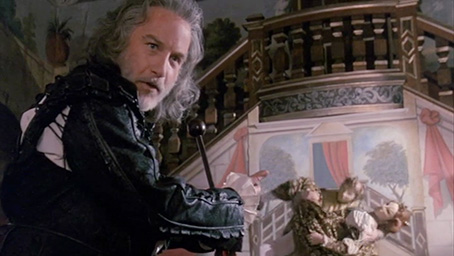
I remember that the normally savvy Roger Ebert was strangely disparaging of the film on its release in ways that still make no sense to me at all. He claims that Rosencrantz and Guildenstern are not interesting as characters (do me a favour), that the interactions with Shakespeare's play are "boring and endless" (say, what?), and that "this material was never meant to be a film, and can hardly work as a film." I could not disagree more, and would argue that such a claim inadvertently dismisses all film versions of works written originally for the stage, including a number of prestige adaptations of Shakespeare's own plays. At the root of this hostility is a common prejudice, one in which a reviewer is so fond of the play or the book on which a film is based that they cannot accept the changes required to make it work as a film. And work as a film it most definitely does, opening out the play in its use of real locations, and making framing, camera movements, editing, and even shifts in film speed very much part of the storytelling process and even the humour.
Even if you were to put all that aside (and why should you?), then the film would justify its existence on its lead performances alone, to the point where I now cannot imagine Rosencrantz and Guildenstern played by anyone other that Gary Oldman and Tim Roth. Both are just sublime here, with Oldman in particular delivering a subtle comic performance so exquisitely pitched that I sometimes run the film just to watch him at work and still catch myself giggling at his intonation, facial expression or way with body language. He brings an almost childlike sweetness to the role, one that extends to his vocal delivery, even in rare moments of loud agitation (the exchange that peaks with his priceless delivery of "I don't know!" is a personal favourite). This effectively casts Roth as the straight man of the duo, but he also does some lovely things with the role, from the weary look in his eyes as his companion endlessly tosses a coin and calls out "heads" (and with his face largely covered at this point, it is all in his eyes) to the look of expectant anticipation he adopts when Rosencrantz announces his latest discovery with the words, "This is interesting." Individually terrific, together they are a joy, and their work here remains some of my favourite of both actors. Of Richard Dreyfuss's barnstorming performance as The Player I was initially a lot less certain, but over time I've come to realise that this is exactly how the part was meant to be played – this is a man so caught up in his role as a (ham) theatrical performer that he no longer knows how to converse in a regular manner. For him the world really is a stage – "We're actors," he states tellingly at one point, "We're the opposite of people." Yet you constantly feel there is more to him than meets the eye, and long before the end it seems clear that he knows more about what is going on here than any of the others who are effectively waiting in the wings.
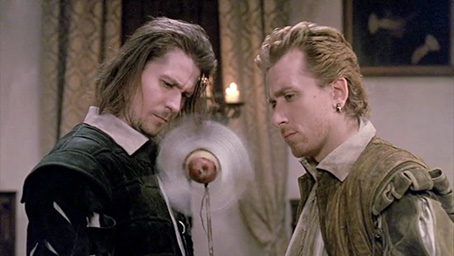
As you may well have gathered, I have a particular fondness for Rosencrantz & Guildenstern are Dead, less for its filmmaking – which is largely unobtrusive but occasionally bewitching – but because it's so entertaining and intellectually stimulating to watch and listen to. I accept that it won't have anything like universal appeal and that many will find the whole enterprise ineffective or exhausting, and if you're not familiar with Hamlet then there's a good chance that some of it will be downright bewildering. But if you do connect with it then there are so many layers to the structure and dialogue, and so much to enjoy in the performances and wordplay, that it remains a work to treasure, delight in, and regularly revisit.
A decent enough 1.78:1 anamorphic SD transfer with well-balanced contrast, a reasonable level of picture detail and colour that feels slightly muted in places but is solid enough elsewhere. Grain is very visible, more so in some shots than others, but the review disc I'm working from is a DVD-R and the compression may be slightly higher here than on the release disc.
The Dolby digital 2.0 soundtrack is very clear and boasts a good dynamic range, though as a dialogue driven film it never has the need to flex its muscles. There is no trace of damage or background hiss.
Optional English subtitles for the deaf and hard of hearing are available.
There are five extra features on this two-disc DVD release, all of them interviews and all conducted by the film's producer, Michael Brandman. But there are no quick chats here, and their collective length is more than twice that of the main feature.
Disc 1
Tom Stoppard Interview (53:18)
The only newly produced extra feature here is an interview with writer-director Stoppard, conducted by Michael Brandman in The Library at The Savile Club in London on 29th September 2015. This is a most engaging chat that covers the origins of the play, the first attempts to make it into a film, the support Stoppard received from his experienced crew, why he ended up directing the film, its Venice Film Festival win (and the slight frostiness he detected from Martin Scorsese when it beat Goodfellas, a decision even Stoppard regards as a little absurd), the performances, the meaning of some lines, and a whole lot more. He very clearly outlines the reasons he prefers working in theatre rather than film, briefly touches on uncredited rewrites of well known films for Steven Spielberg and George Lucas, and nails my own disenchantment with the current Hollywood output by suggesting it consists of movies made for adolescents but marketed to adults.
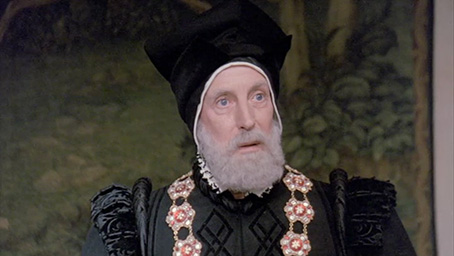
Disc 2
All of the interviews here were recorded in 2004 for a previous DVD release (not the one I have, I should add), are framed 1.33:1, in fine shape with clearly recorded soundtracks, and are all hugely enjoyable to watch and listen to.
Tom Stoppard interview (59:20)
Given that this earlier interview with Stoppard is also conducted by Michael Brandman and runs for similar length to the one on disc 1, the fact that much of the same ground is covered – sometimes almost verbatim – in both interviews is perhaps not surprising. There are some variations here, with the genesis, development and success of the play covered in more detail, but as things progress you'll likely find yourself experiencing pangs of déjà-vu, unless you chose to watch this interview first, of course.
Gary Oldman Interview (58:40)
Oldman, who has one of the sunniest and most face-transforming smiles in the business, talks about landing the role of Rosencrantz and what drew him to the part, his perception of what the play is about, how much he and Tim Roth enjoyed delivering Stoppard's dialogue (which they would endlessly rehearse just for the fun of repeatedly playing the scenes), and how he can never now watch a performance of Hamlet without imagining him and Roth hiding behind the curtain when Polonius is killed. Interviewer Brandman then moves on to Oldman's career in general, including his only work as director to date, Nil By Mouth, and its impact on his subsequent work as an actor. There are questions he struggles to answer definitively, but has plenty to say when asked how the business of acting has changed since he made his debut – being talented isn't good enough any more, he assures us, and you now also have to work at being famous, something he has no interest in doing.
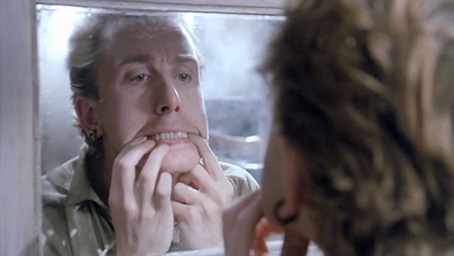
Tim Roth Interview (33:09)
Roth is asked many of the same questions as Oldman here and I have a feeling the running time of this interview is so much shorter because Roth is so focussed and enthusiastic in his answers. There's an entertaining story about how he landed the part of Guildenstern and he confirms Oldman's story about how they would rehearse scenes over and over just for the fun of doing them, even replaying ones that they'd already shot. He talks about working with Robert Altman on Vincent and Theo (which, he assures us, was great fun to make), working with Quentin Tarantino on Reservoir Dogs, and selects his directorial debut The War Zone and his first role as a paid actor, Made in Britain, as his two favourite film jobs.
Richard Dreyfuss Interview (45:42)
The self-effacing Dreyfuss freely admits to not fully understanding the play or quite why Tom Stoppard approached him of all people for the key role as The Player. He admits to immensely enjoying the opportunity to chew up the scenery, and reveals that he loves Hamlet and still yearns to play the lead despite now being too old. He feels that his Best Actor Oscar win for The Goodbye Girl came too early in his career, despite picking that film as one of the best experiences of his career, names Steven Spielberg as his favourite director to work for, and delivers a fascinating and detailed breakdown of the differences between acting for theatre and film, including a nice story about how layers of pretence lead to truth.
The influence of Samuel Beckett and Waiting for Godot in particular on the writing here is clearly evident, but Stoppard creates characters and dialogue so distinctive that the film never feels trapped in Beckett's shadow, and the execution is so deft and cinematic that I rarely felt I was watching a filmed stage play. Rosencrantz & Guildenstern are Dead is a personal favourite given a decent if unexceptional SD transfer but with a welcome collection of substantial interviews with the writer-director and his three main actors. For the film and those extra features, this has to come recommended.
|